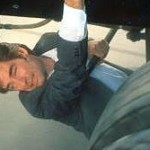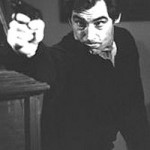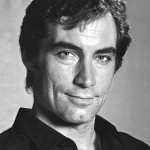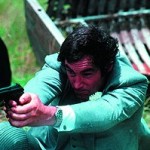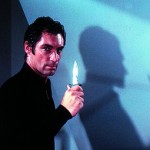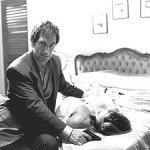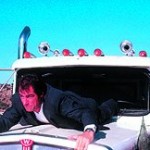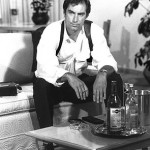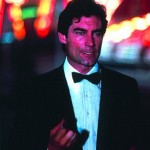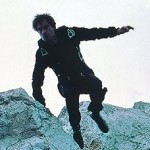First published in ‘OO7’ MAGAZINE (issue 21)
Timothy Dalton talked to ‘James Bond author Raymond Benson for 007 Magazine, Issue 21, about playwrights, the theatre, Ian Fleming – and that man Bond.
First of all, let me say that I saw the new film, and I think it’s great! I really liked it!
Well thank God for that, because if you don’t, we’re in trouble.
I think it’s the best Bond since, say Thunderball. It’s the kind of Bond film I’ve been wanting to see for years.
Good, good. Well, it’s the kind of Bond film – we’ve taken a big step, a leap … it’s back in the proper world, it’s back in the right world of James Bond. I think Ian Fleming himself would have liked this one.
I’d like to start out talking a little about your theatre work. How do you compare film making of this sort with the theatre? Does your preparation for a role differ in any way?
No, I mean, it’s interesting isn’t it? Everyone seems to perceive that there’s a huge difference between working in the theatre and working in films, and there isn’t really. The principle is the same. You’ve got a story, you’ve got a script, and your job is to understand it, to analyze it, to comprehend its structure and then to see what part in that structure, the part or role you’re playing, and then to understand your character and try to fulfil the author’s intentions – bring it to life, I mean it’s the same principle. For example, if we were in a small theatre with people over there, they would be able to hear us and relate to us just as well. Obviously the theatre tends to be comprehensive, lets say, in language, certainly in classical theatre, than movies, but the principles just the same.
Do you find it difficult adjusting as far as the bigness of gestures in film and theatre?
In theatre you have to play slightly larger than life; did you find that adjustment difficult?
I’m not entirely sure that’s true I know it has the appearance of being so and it’s certainly true that some actors do play the large scale in the theatre; but I think the best actors on stage are the actors that certainly appear to be, as in film, actually truthful. The difference is, of course, you can put a camera right in on somebody’s face, but both mediums need an active energy of thought and feelings and it’s amazing, even in the theatre, how far absolute truth carries. And you must be the same in a movie. Of course, there is that difference, you can do some gestures – a look of an eye – that you can’t do in the theatre, but then you adjust your theatre performance to whether you’re playing the part in a small theatre or a large one or whatever, but essentially you’re working towards finding the moments that reveal the truth. It is the same.
Do you feel that doing Shakespeare is the ultimate challenge for an actor?
No, I think the ultimate challenge is doing whatever you’re doing right. Or as best you can do it. Shakespeare is undoubtedly one of the world’s greatest, greatest writers. It has enormous challenges in its own right, but there’s a challenge in anything, in any movie. Nothing can ever be perfect, but it’s perfection you’re aiming for.
Do you have a different approach to verse than you do to straight dialogue? Do you follow the Barton-Hall method?
Well… verse has its own rules. But it depends on the kind of verse. You can talk about two styles, you can be extremely effective in expanding the language, expanding the verse, turning it into something else; I think actually you should never remove anything from the necessity to communicate its content. You should never take it off into ‘la di la di la’. I mean the writer’s written something – he’s written a message. There’s content to what he’s written. He wants to communicate something through his writing. If he’s put it in a strictly passive verse form, that’s one thing; if he’s put it in a loose, Iambic form, that’s another thing. But never forget, certainly in a play, it’s about one person talking to another, wanting to communicate something to another, and for me the best way to do it is to find the truth to that and to believe it and communicate it like you mean it, so that the person you’re talking to understands you and feels you, and so the audience does as well. Shakespearean verse is wonderful, it’s written in the sort of rhythms of the English Language; Americans, if they can forget trying to play it ‘English’ and just use their own accents, it brings Shakespeare to life quite easily.
I think that’s the mistake a lot of American actors make.
Me too, me too! Because all that matters is that you communicate your idea. Of course, in Shakespeare you’re talking about thought patterns that are very large. Sentences and ideas can encompass three or four lines that you must be able to hold in you head and then communicate it like you mean it. I mean, everything has its demands. Pinter, who you would think is writing very naturalistically, is not writing naturalistically at all! He writes a sort of distilled essence of naturalism. Art is not reality, but the appearance of whatever reality is appropriate.
Have you ever done Pinter?
You know, I never have. He’s my favourite playwright. He’s brilliant – wonderful. I would like to.
Do you have any particular roles that you’ve ‘always dreamed of doing?’
No, I’m sure some people do; but I think most actors probably don’t, because what your dream is, what you want to do, your desire, your goal, your aim, is to play in wonderful pieces! I would hate to say wonderful parts, because a part doesn’t exist in isolation, it exists as part of the play or movie script itself. I think if you just had one goal, it would be awfully limiting – what would you do once you’d done it? The goal should be in good work and hope to continue to be in good work, and continue to be able to improve within that and take on all those challenges.
Do you have any favourite roles that you have done?
Uhmm, yeah I guess. It’s difficult to distinguish between those that were successful and those that you liked. It’s also difficult to distinguish , really, across a time span, because those you did ten, fifteen, twenty years ago obviously are now much more a part of one’s own history. I can only talk in recent terms rather than overall terms. Certainly I loved doing the O’Neill play ‘A Touch of the Poet.’ I’m very proud of that production.
Are we going to get to see that over here in the States?
I doubt it. There was a moment when we could have brought it. But you know, time, and other people’s commitments. I wouldn’t like to ‘re-do’ it, I’d like to bring it here with the production we did. I think he’s (Eugene O’Neill) the greatest modern writer – others would argue with that, but certainly one would agree he’s one of the 20th century’s greatest writers. It was a forgotten play, and the way we did it, was I think right. And several of the critics said that this must now be regarded as one of his master-pieces. Well, if you can do that to a ‘forgotten play’ then that of course gives one tremendous satisfaction. So there’s that part. I loved doing Petruchio in ‘The Taming of the Shrew’.
I would have thought you could do Henry V really well.
Well! It’s funny you should say that, because ‘Taming of the Shrew’ was a great hit, again through luck and judgement, and was a great show. But of course its subject matter – I don’t think there’s anything wrong with its subject matter at all, fundamentally; it’s saying that true love exists when two people get to know each other. If they fall in love with each other superficially on surface appearances, it’s going to fall apart. We see that story in ‘Taming of the Shrew’. The two people actually explore each other, get to know each other, struggle with each other, and end up truly loving each other. But you know, a lot of people see it as a chauvinistic or anti-feminist play. And I remember one of the critics who happened to be hugely enjoying it, laughing all the way through, decided to write for his paper a sort of feminist review. His only comment about me was that I was the best Henry V of my generation! (Laughs) I don’t know if you’ve seen ‘Hawks’, but I hope it will be out here soon. For some dumb reason, the Americans have decided to cut out the parents from the movie, and that I think is important because it gives the two guys their world of loneliness. I’m very proud of it – it’s a wonderful film. I would have thought it would have been released here already. Well, you’re talking about two guys who have cancer. It’s not actually about death, it’s in fact about life, how precious life is and how it should be seized and grasped and how. Why do we always take tomorrow for granted? Why does it always take a crisis like a war or some doctor telling you you have a dicky heart or a cancer to make us value what it is we’ve got. The premise of that, of course, is death, so I’m sure people think it’s not particularly a commercial subject, although it’s relevant to every single human being on the face of this earth! We all know people who have been affected by cancer, and we all have a life to live and we all waste a lot of it.I think that’s a lot of the key to Ian Fleming. Even though he knew he had a bad heart and that he should cut down his smoking and drinking, and all that, but he embraced life so much – he was always searching for sensuous pleasures and lived life every day to the fullest.
Yes. That quality might not be reflected in the Bond movies , but it’s certainly reflected in the Bond books.
How did you prepare yourself for Mr Bond?
You know the answer to that question, don’t you? It’s simple. He wrote it. His books gave rise to the first movies. Those movies have gone on for 27 years. He must have done something right. But anyway, beyond that, as an actor the only way I could approach anything is, I mean I feel my duty as an actor is to work with the author, to reveal the author’s intentions. Particularly ‘Casino Royale’, which I think is splendid. It’s an amazing first novel. Yeah! That doesn’t mean you can bring all those qualities to all the movies because each movie is different and each story is different, and anyway they’re not all written by Ian Fleming. But certainly they’re written of that world, we’re talking about a Bond movie, so it’s Fleming. Within the criteria of the framework of what is possible. I mean, I loved, for example, I found it quite surprising, one of the reasons why I liked The Living Daylights as a basic script, that terrific moment with Saunders when he says, well f*** it, I don’t care if he does fire me. And Fleming was always writing about this thing called, and we use the word ‘acidity’ in the movie, but it was cut. You know that was at the very beginning of the movie, and as soon as I saw that scene, I thought – wow, this is Bond! Well, it’s a thing Fleming always, always talks about because the man is a paradox. He is a killer! a murderer! He’s a bad lad! but he’s on the side of good! and how do I live with this paradox? And that’s interesting! So I was very pleased to see that in The Living Daylights.
There’s even more of that in Licence to Kill.
Do you think so?
Yes!
Good!
I mean the scene with you and M. You punch your way out of your meeting with him!
Yes.
That’s never been done before!
No. And it certainly reflects his own determination to do what he believes is the right thing.
What aspects of the character did you find appealing or unappealing when you first started working on it?
I don’t think like that. And as an actor, you start with the story, and I’d never done an action-adventure thriller before. And I knew the danger of taking on something like Bond was immense; you know that if it hadn’t worked, it would have been a very serious, serious problem for me personally. And I think, in many ways, that perverse thing in all of us wants to take on a challenge and risk oneself, and I wanted to see if I could overcome that challenge and get these movies back into being in a world that I consider to be James Bond word. I mean if you like the books, if you like the early films, why do you like them? Sure, they’re fantasies, sure they’re wonderfully exciting thrillers, but what’s the purpose of the things? Well, we know about heroes, whether they’re Raymond Chandler heroes or western heroes or James Bond heroes; but essentially, you want to go and sit in a cinema in safety and lose yourself in a world of imagination, into a dangerous, exciting world that hopefully one will never actually be part of. But that’s what a Bond movie should be. It’s not a cartoon. It’s not a light hearted tongue-in-cheek comedy, however entertaining, but that’s not real – I wanted to see if Bond could get back into that. But talking about what do you like about it, you just think: does the story work? Can I make the part work within the story? Whatever the guys qualities, you can play the sleaziest, nastiest man whose got qualities you’ve got no admiration for at all, but as an actor it’s still part of your job and it’s one of the interesting challenges of your job – can you play this part? Whether you like the qualities or not doesn’t really enter into it.
What kind of physical preparations did you have to make? None.
Did you have scuba training?
Well, this is one thing – I did have to learn to scuba dive.
Parachuting? Did you do any of the parachute stuff?
(smiles) Well, we don’t talk about that. I think it’s safe to say now I won’t tell anybody about how the stunts are done, how effects are made, because that’s all part of the enjoyment. You remember, as I do, when we were all a lot younger and watching Dr No for the first time and how you were on the edge of your seat when the tarantula crawls up his chest – if you knew there was a piece of glass between him and the tarantula, the moments blown!
But you did some actual scuba work?
Yes, I did learn to scuba dive. It’s important. I am involved in all the action. I am involved in every single, whatever you want to call it, action sequence or stunt sequence, I am involved in it all. Because it’s an action-thriller. You’ve got to know that Bond is there! You’ve got to be with Bond in his moments of danger. Otherwise you’re conning the audience. And you’ve got to be able to get a camera in there. So I get involved in everything. That isn’t to say that there aren’t stuntmen. But nobody does anything dangerous – the skill is to make it appear dangerous. But I did get out of the helicopter on the wire.
Unlike some of the other actors who have played Bond, like a true theatre craftsman, I can really sense that you’re searching for and using the subtext. For example, your reading of the line ‘shaken not stirred’ was so fresh…
Oh that’s right, he uses it as a put down to her. I mean, we know you’re ordering a drink, but the subtext is ‘get out of here, I want to be alone with this woman’.
Does the director, John Glen, work with the actors at all in `bringing out the subtext’, or is that your own work?
It’s a collaborative effort. I mean, in the movies the director must be the most harassed, under pressure man on the entire set. He doesn’t want to be telling people how to do their jobs, he’s got to be responsible for the movie and for getting it organised and shooting it and making his movie. He doesn’t want to be telling the lighting cameraman how to light it, you know, he wants people to come to him with ideas to choose from, with alternatives, with input.
Do you get any rehearsal time?
We get a bit, but you don’t rehearse films much.
Do you wish you had more?
Well, sometimes and sometimes not. It depends on the nature of the scene. But what we will generally do, as on any film, is something that I’ve always insisted on – I mean, I haven’t had to insist on it, it’s just the way one should work – you take the scene and you work the scene – maybe briefly, maybe quickly, but you’ll explore the scene and then you do it bit by bit. You have to know where you’re going, you have to know what’s what. But real rehearsal, no there’s not a lot, and sometimes, it depends on the actor, the spontaneity, as long as you know what the scene is about, as long as you know what you’ve got to achieve in the scene, as long as you understand its physicality, it’s sometimes good not to rehearse because providing the aim is in your head, the spontaneity is important in itself. In theatre what you always notice is that sometimes first rehearsals are marvellous, but then you always get stale after a while; but then after a further while as a result of the exploration you’ve done, as a result of the conclusions you’ve come to, it starts to come fresh again. But you do go through that stale patch. That mustn’t happen on film – you’ve got to capture moments of truth, aliveness and spontaneity.
Do you think Bond could work on stage?
If the opportunity arose, would you be interested in Playing James Bond in a stage play, if it was done the right way?
I couldn’t really see it being done on stage. I mean its very essence is not introspective.
Something low key like Casino Royale?
Well, Casino Royale, other people have the rights of course, but to make a film like Casino Royale properly, it would be so outside what is currently accepted as James Bond on film, but it would make a bloody good film. Done as written, it would make a great film. I see it black and white, 1953… Done as a period piece, yes, I’d love to do that film, but other people have the rights, and it would be so far outside what people would expect of James Bond, who knows how it would be received – but it’s a cracking good story. But on the theatre, I couldn’t imagine a James Bond story in the theatre.
How has playing James Bond changed your life, positively and negatively?
Hardly at all negatively – I’m very happy to say that. Positively – professionally, of course, because the nature of our world is a commercial world and if you can have a commercial success then you’ll get a lot more offers.
What about the legions of fans who’ll hound you for autographs for the rest of your life?
Well, that’s all b******s, isn’t it? It’s all bullshit. That is not true. You get all that when you’re in a publicity situation. There might be a few people outside the hotel, but those are the professional autograph bounty hunters, or the paparazzi. But you or I could walk down the street here or in London, and people would certainly recognise me, but nobody is going to bother me. Most people on the street are healthy, decent people with their own sense of self respect and integrity and they’ll treat you regularly if you behave regularly. If on the other hand you behave like an asshole, and go around with battalions of bodyguards and limousines and press and photographers and all that, and make an issue out of it, then it’s a different story. The majority of people who go and see a movie or play, if they like it, they come out and say that was a bloody good film or play, and so on, but they’re not going to go around to the stage door; they’re not going to write and ask for an autograph. Only a tiny percentage of them will. And the bulk of that percentage are people who really just want to say that was great and would you mind if I had an autograph. The kind of thing you’re talking about is the tiniest minority, and it’s a bit odd anyway. The Bond world has that group, you know, like the Star Trek and Batman – it’s got its legion of fans. It’s going to last. Frankly, I love it from some. Someone in the airport the other day just said, ‘I saw the film – terrific – thanks’, and walked on. That felt great. That’s how I would react, that’s how you would react, if you see a performance you love, and if you ever met the guy, maybe – but even if you did, even if you were in a restaurant you might not want to disturb him having his dinner, you’d just think ‘Oh, there’s…’. But some people make a profession of being a fan. It’s on the edge of abnormality in a lot of ways. It’s gone beyond genuine care and respect. And there’s not many of them. The press tend to build up all the screaming hoards. Sure, if you go to a premiere it’s par for the course, it’s everybody’s game. New rules are set. But just going down the street to the pub, the real world is not a problem.
So you don’t get much of that?
And I’m very pleased. As an actor you can’t cut yourself off from your roots; you can’t cut yourself off from the foundations of your work, and they are people – it’s people who you act, it’s people you take parts in stories, life is about people. If you’re stuck up on some hill surrounded by barbed wire and guards – how could you be in our business if you remove yourself from our world?
What was your first initiation into Bond – the books or the early films?
It was the film Dr No.
Can you remember what really struck you about that?
Well, I don’t remember how old I was, 15 or 16 – 1962, I must have been 15 when it came out. And it was splendid, if you think about how things were at that time; I don’t know about America, but what kind of movies were you watching? War stories, drawing room comedies out of the fifties, and this film Dr No just came and took the cinema by the scruff of the neck and banged it right down into today. As well as giving us a whole new area of adventure story to explore. And it was terrific. And then they went on. The miracle is that they’re still as popular as they ever were. That is in great part due to the essence of the stories, because they are hero stories, and hero stories have crossed all cultures, all history; people need heroes. But they’ve always been done bloody well. Mr Broccoli’s never attempted to cheaply exploit a previous success. He’s always tried to make sure that every single film is done better than the one before or absolutely as best as it can be. The money spent, the talent…
Objectively how do you think you compare to other Bonds?
I don’t think about it. It’s a futile exercise. It becomes so complex. It’s true that I’m acting in a public sense, and I would include myself in that, that over 27 years of Bond movies, everyone has their own idea of what a Bond movie is. The fact that every single movie is tremendously different from the other. I mean how can you look at a film like From Russia With Love, a Bond film and compare it with Moonraker? It’s such a different story and it’s such a different style. Connery was in a certain kind of movie and even the style of those movies began to alter. The first movies, if you look at them now, they have a different effect than they had when we watched them originally. They’re of their time, but they were in general wonderful adventure thrillers. The Moore movies were light-hearted and tongue in cheek technological extravaganzas. You can’t compare Moore and Connery because they were in such different films. I leave it for other people to make comparisons. The other interesting thing is, of course, and the problem we all face, is that if nobody had ever heard of a James Bond movie, if there had been no James Bond movies ever, and The Living Daylights or Licence To Kill or any of the movies was just released as a movie in its own right, the public opinion and appreciation and reaction would be completely different! It’s because one is carrying all this history. It’s like going out and playing Hamlet. How can anybody do Hamlet these days? Everyone knows the bloody story, nobody’s surprised. Nobody’s been taken by spontaneous reaction.
Given that Bond is something of a role model for young people…
A role model?
Sure, when I was a kid and saw Goldfinger, I was buying all the toys and running around with my eyebrows raised and all that…
Connery didn’t raise his eyebrow! (laughs)
Do you think Bond should de-emphasise any of his traits? Do you think you have a responsibility as an actor to…
I don’t think that Bond is a role model or that he should be a role model. He’s only part of a particular kind of story. I don’t think anyone should grow up wanting to go around killing people. I don’t think anyone should grow up wanting to be a secret agent…
I did! (laughs)
Well, we’re in a different world now aren’t we? In those days we all had a sense of intrigue and mystery and a sense of justice and rightness about our countries. In this day and age, I don’t think people have too much regard for the work of their own secret services, do they? I think it’s certainly well worth believing in some kind of truth and justice. But Bond is not a paragon of virtue; he’s a man riddled with vices and weaknesses as well as strength. But that is the nature of the man, and the nature of the world he lives in, but I don’t think he should be a role model.
Do you think he should practice safe sex on screen?
I don’t think we’ve ever seen sex in a Bond movie.
Licence To Kill is probably the most violent Bond film ever made. Do you have any comment on that. What would you say to critics who might attack the film for being too violent?
I wouldn’t say anything to the critics – they have every right to their opinion. I don’t know that it is the most violent Bond film, because you must judge it in terms of its time. Don’t forget that Dr No created an outrage, not only for its violence, but for its sex. But there’s no sex in Dr No at all, so what were they talking about. What they were actually talking about in ‘62, although we think of the sixties – the sixties didn’t really begin until the mid sixties, ‘62 was still the fifties – what they were talking about was Ursula Andress coming out of the waves in a bikini! It was the first time we’d seen a bikini! That was an outrage sexually! As for the violence – it was given an A certificate (in Britain this classification meant you had to be accompanied by an adult to see the film) because Bond gunned down an unarmed, defenceless man, you know – ‘You’ve had your six’, now that for its day was considered a) wrong, morally wrong and b) very violent. Now everything in our movie, first of all I’m pleased that our movie is more violent, because that is the world that James Bond must live in, and if you don’t like that, I’m sorry, don’t go and see the film. We’re not making movies for kids, we’re making movies for adults – it’s an adult fantasy that kids will enjoy. Yes I agree that kids can see this and they should go and see it, but we’re not making the film for 11 year olds! We’re making the film for the child in all of us adults. It is a violent world he inhabits – it’s the very nature of a Bond movie. But whether it’s more or less violent is relatively speaking; I mean everything is classic, isn’t it? I mean, people getting fed to the sharks, to the piranha fish, people getting set on fire, people being shot with harpoon guns, people being shot with bullets, Bond killing people – they’re all classic elements of the genre! In a modern world you do them to the height of your skills, and is it violent? Yes, it is violent, but you don’t see the violence. What the film makers do, which is brilliant is they create the tension, the extreme tension of violence. The violence is all in the mind.
If Ian Fleming was still alive today and you had some influence on how he was going to take the character in a certain direction, would you have anything you would say to him? Where would you like to see Bond go or happen to him?
Well, if Ian Fleming was alive today, I’d love to spend time talking with him about the character, and I’d love to be involved in making the film, as I’m sure everyone in our organisation would be. But I think I’d leave the creative ideas to him.
Where do you think 007’s future lies as far as the nineties are concerned?
I don’t know. It’s always important to remember that he doesn’t really operate as a spy or a member of the secret service. At the end of Casino Royale, Fleming did make him a hero, the man who does it virtually alone. And that theme is universal – the hero theme, no matter what sort of hero you’ve got, a white knight, or a man of many paradoxes, you’ve just got to make sure the stories have some modern relevance and they mean something to a modern audience, and then rely on creativity and imagination to create those stories.


